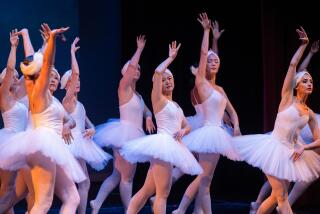Mukhamedov: His Body Language Is Unmistakable
- Share via
Irek Mukhamedov doesn’t stroll or saunter toward a group waiting for him in the lobby of a Hollywood hotel where the entire Bolshoi Ballet is billeted for its Music Center engagement: He nearly sprints.
Entering with a burst of energy and motion, he pulls out a box of Marlboros and quickly lights up, grinning knowingly when someone chides him for risking his health. But the whole picture seems to confirm his onstage reputation: a space-devouring dynamo who can sculpt steps in the air and catapult across stage in speed-blurred turns.
Even here, without theatrical embellishments, the 27-year-old Soviet suggests the athletic power that has landed him in the critical and popular spotlight of this current Bolshoi tour.
Talking, however, is not necessarily his gambit. Especially the kind of talking that requires an official Soviet translator and includes a whole entourage.
In fact, if one saw him and did not hear him, he would fit right into the Hollywood scene. Wearing a red-striped T-shirt and chinos, he exudes the kind of macho swagger and self-aware physicality common to movie hopefuls. A young Robert De Niro, maybe, or Mickey Rourke. His full-gaze contact and open-faced directness are, at least, remindful of these rugged two.
But Mukhamedov, a native of the Tartar Republic who has danced with the Bolshoi for six years, politely answers questions and takes a dutiful approach to being interviewed via a Bolshoi translator. He leans forward across a table, intent on the task at hand and stubs out a cigarette after two token puffs.
An invitation to join the Bolshoi caught him “by delighted surprise,” even though he won the Grand Prix--a cash prize, a gold medal and the title of Laureate--at the Moscow International Ballet Competition in 1981, the only other person besides Nadezhda Pavlova ever to be so honored.
And no, he didn’t feel any particular sense of irony at being passed over by artistic director Yuri Grigorovich upon graduation from the company school and now becoming the Bolshoi’s most celebrated asset.
Curiously, Mukhamedov also failed his entrance audition to the Vaganova Institute in Leningrad (school of the Kirov Ballet). “But I always wanted to dance with the Bolshoi,” he says, “because it promotes the theatrical qualities I love more than any other.”
He does not agree, on this occasion, that Grigorovich’s 23-year reign has produced a company of male-dominated choreography--although his statement contradicts what he said in an interview in Dancemagazine (April), one conducted directly with a writer fluent in Russian.
“What is ‘Giselle,’ ” he asks, “but a ballerina’s vehicle? And what about ‘Raymonda?’ ” In his own choreography, though, Grigorovich has given the men wonderful works like ‘Spartacus’ and ‘Ivan the Terrible,’ ” which, Mukhamedov says, is the role for which he’s most grateful.
A true partisan of swashbuckling Bolshoi tradition, Mukhamedov revels in these heroic ballets that show his full-out generosity of portrayal and technical daring. But he is also said to excel in the grand operatic gesture of a Romantic challenge such as “Giselle.”
“Each role poses different challenges,” he says, “but I like Ivan the best because it reveals all my abilities--technical, dramatic, lyric. Grigorovich has a way of combining these elements so that his choreography is both easy and difficult.
“It’s easy because it uses what a dancer has. It’s difficult because it charges the dancer with so much responsibility. And I find myself completely in harmony with everything the Bolshoi does and aspires to.”
In discussing a Mukhamedov specialty--hanging in the air as though he has dispensation from the laws of gravity--he makes a point of distinguishing the technical feat from the theatrical action.
“For an athlete, a jump is just a jump. He measures his elevation. For me, it’s not the distance that counts but it is the dramatic intent of the moment. It has to mean something. I put myself to every technical and artistic end.”
The statement attempts to dispel criticism that the Bolshoi today promotes technique over artistry--a position taken by Ekaterina Maximova, one of the dissenting luminaries of past glory, who together with Vladimir Vasiliev, Maya Plisetskaya and others, publicly protested Grigorovich’s artistic policies.
The response passed along by the interpreter: “I have only respect for Maximova and the others. They are great dancers. But the choreography has taken a big step forward and it needs the strength that only youth can provide,” he says, referring to a decade ago when the average soloist’s age was 34, as opposed to the current average of 27.
Mukhamedov doesn’t seem to take much personal gratification from the popularity such strength affords him. The tremendous response to his debut performances in this country elicits no more than “I feel good about it. It’s OK.”
But he is impressed with “how knowledgeable” American audiences are and the fact that they can discern one style from another. As far as he is concerned everything connected with the Bolshoi brand of spectacle has its artistic justification.
The one-arm lift, for instance, “which at first caused me to be a little afraid, means different things in different ballets. For Spartacus holding Phrygia aloft it is a symbol of his strength and tenderness. In ‘Spring Waters’ it is a bravura expression that matches the music. It is never just a trick.”
At this moment of his career, Mukhamedov is perhaps not inclined to test the waters of glasnost or express interest in affairs outside the Bolshoi. But neither does he make ringing endorsements such as “Grigorovich is for me czar and God,” a comment attributed to him in Connoisseur magazine.
Rather, his talk is low-keyed, modest. “In Russian we have an expression,” he says. “Modesty adorns a person.”
More to Read
The biggest entertainment stories
Get our big stories about Hollywood, film, television, music, arts, culture and more right in your inbox as soon as they publish.
You may occasionally receive promotional content from the Los Angeles Times.










